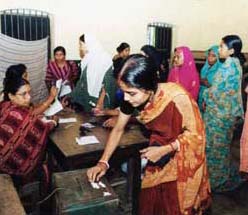 |
 Anti-Trafficking |
 |
| Population & Health | Democracy & Governance | Anti-Trafficking | Enterprise Development | Energy |
| Environment | Food Security | Disaster Management | Education | Gender |
- Once oriented into the sex trade, a girl might find herself forced to service an average of ten clients a day.
- Those trafficked often live in horrible conditions and suffer from a full array of chronic
infectious diseases, especially sexually transmitted diseases.
- Girls who manage to escape from the sex trade and return to Bangladesh are often not accepted back into their communities -
they are considered "spoiled". They are forced to go underground selling sex to survive.1
1"An Overview: Trafficking of
Women and Children in
Bangladesh". ICDDR, B:
Center for Health and
Population Research, 2001.
Trafficking of Women and Children (PDF)
What is Trafficking All About? (PDF)
A Trafficker Speaks (PDF)
Camel Jockeys: Another Trafficking Evil (PDF)
Trafficking: Survivors' Stories (PDF)
Article: Fighting India's Girl-Trafficking Trade (PDF)
USAID's Response: Anti-Trafficking
USAID supports local and international non-government organizations (NGOs) to put a stop to the
trafficking of women and children. Our efforts in anti-trafficking are built on five basic pillars.